






























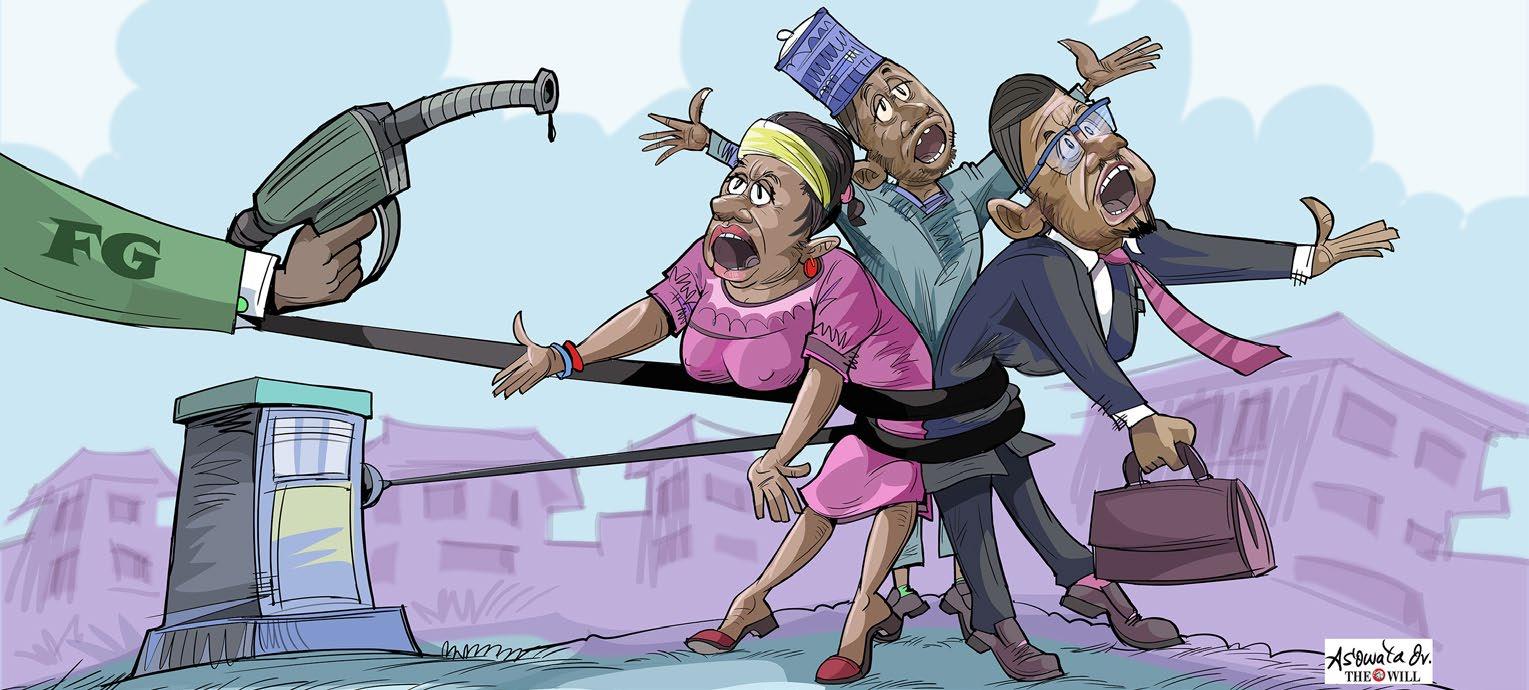


OnahNwachukwu Editor, THEWILL DOWNTOWN









Nigeria’s music industry is the biggest music export out of Africa. However, the artists alone are not solely responsible for this rise. Most of the credit can be given mainly to music producers. These geniuses are responsible for creating the beats that dominate the charts, shaping the sound of Afrobeats, and pushing Nigerian music to new heights worldwide. These producers’ ability to blend African rhythm with modern, international sounds has produced hit songs recognised worldwide. The producers are recognised for fusing elements from electronic music, hip-hop, dancehall, and traditional African genres to create sounds that push the boundaries of creativity. These producers are instrumental in elevating Nigerian music and introducing it to a global audience.
On pages 8 to 10, we spotlight producers like Don Jazzy, Sarz, Legendury Beatz, Pheelz, and Masterkraft, who have played vital roles in transforming Afrobeats from a local genre to a global sensation.
Slip dresses are always in style and can be dressed up or down depending on the occasion. Our fashion pages explore six chic ways to wear a slip dress. Scroll to pages 4 and 5.
Contouring is a vital makeup technique that helps you accentuate your features and achieve a sculpted appearance. Our beauty page walks you through six easy, step-by-step guides for contouring your face to give it a clean, finished look. You’ll find this on page 12.
Romantic relationships demand work, time, and emotional commitment; however, excessive stress can lead to burnout. A relationship burnout can leave you feeling emotionally, psychologically, and physically exhausted. But do not worry; we list ways to overcome burnout on page 15.
As usual, our movie review page has a playlist compiled just for you. To download, click the instructions below the QR codes.
Until next week, enjoy your read.







SUNDAY, SEPTEMBER 8, 2024






BY AMOS ESELE WITH REPORTS FROM UKANDI ODEY, KAJO MARTINS, OKIOMA AMOS AND ABDULLAHI
YUSUF, TUNDE OMOLEHIN, SAMSON UHUEGBU
For probably the first time in the history of Nigeria, the people in their various professions, associations, and businesses allied to fault a flawed government policy.
A few hours after the Nigerian National Petroleum Company Limited Retail Management on Tuesday approved an upward review of the pump price of petrol from N617/litre to N897/ litre, effective September 3, 2024, the organised private sector, comprising the Manufactures Association of Nigeria, MAN, the National Association of Chambers of Commerce Industry, Mines and Agriculture, NACCIMA, the Nigeria Employers’ Consultative Forum, NECA, alongside the Nigerian Bar Association, NBA, the Nigeria Medical Association, NMA, Afenifere, Yoruba Elders Forum, the Coalition of Northern Groups and Federal lawmakers, not to mention the Nigeria Labour Congress, NLC and the Trade Union Congress, TUC, rose with one voice in condemnation of the price increase.
The Chairman of the House of Representatives Committee on Petroleum Resources (Upstream), Alhassan Doguwa, also urged the executive to reverse the increase saying, “As a committee, we urge the Nigerian Government and of course, the NNPCL to consider the plight of Nigerians and suspend this recent increase in pump price of petrol.
"Nigerians are currently going through a lot today and adding to this burden is not in our collective best interest. Let us revert to the old pump price as soon as possible. And probably intensify engagements with major stakeholders to address the problem.”
TINUBU REACTS
But 10,925 kilometres away in Beijing, China where he attended
the 2024 Summit of the Forum on China-Africa Cooperation, FOCAC, President Bola Tinubu on Friday reacted to the lamentations back home. The president is now in London, England on a private visit.
Addressing members of Nigerians in the Diaspora Organisation in China (NIDO China) and the Nigerian community at the China World Hotel, Tinubu said, among other things, that “Nigeria is going through reforms, and we are taking very bold and unprecedented decisions. For example, you might have heard about fuel prices from home in the last few days.
“But can we help it? Can we develop good roads like you have here? You see electricity being constant in quantity and quality. You see water supply, constant and running, and you see their good schools. And we say we want to hand over a banner without stain to our children?
“What is the critical part to get us there if we cannot take hard decisions to pave the way for a country that is blessed and so talented?
“So many of you are so talented, speaking very fluent Mandarin. It is what you contribute and tell them at home that will reflect in the attitude of our people. The more you want everything free, it will become more expensive and long-delayed to achieve meaningful development.”
Senior Economist and partner, SPM Professionals, Dr Paul Alaje, faulted the president’s optimism at the weekend. Speaking with THEWILL on the new petrol price increase, he said the price will keep increasing because the Federal Government is yet to tidy up its micro-economic policies.
Alaje said, “When the NNPCL talked about market forces, there is no way we will allow our economy to grow if we are not producing and exporting enough. Our real challenge as a country is because we have floated our currency. Imagine what the exchange rate was today (Friday), as it gets bad, the prices of anything imported into the country will get worse. NNPC had said they were owning so much and they wanted to ease the burden, which is exactly what they have done with the price increase and allow the people to carry the burden.”
The Spokesperson for the pan-Yoruba social and political organisation, Afenifere, Jare Ajayi said apart from its wide-range social and economic impact on the citizenry already going through hardship, the policy would negatively impact progress achieved through some government policies.
“Failure by the NNPC Ltd to reverse the latest increment in fuel price will rub off negatively on some policies of President Bola Tinubu’s government to ease things for the citizens, especially such policies as the Students Loan Scheme and Consumer Credit Scheme that are just taking off, “ he said, adding that “It is crucial, therefore, that the government orders NNPCL to reverse the price hike forthwith, as it is already causing untold hardship for the people,” he said.
With the countdown to the September 15 deadline, which the NNPCL chose as the day for the supply of petrol from the $20 billion Dangote Petroleum Refinery, queues were yet to ease at many petrol filling stations across the country, which are, in some cases, deserted because of the inadequacy of supplies despite assurance by the Executive Vice President of
Downstream, NNPC, Adedapo Segun, that the current fuel scarcity was expected to “subside in a few days as more stations recalibrate and begin selling PMS.”
Even so, with the product selling for between N860 per litre and N880 per litre at NNPC Mega Stations in the nation’s capital, Abuja and its commercial hub, Lagos, many filling stations were under lock and key.
BAYELSA, KWARA, LAGOS, PLATEAU, BENUE, SOKOTO, IMO
For example, the 84.3-kilometre Lagos Abeokuta Expressway up to Oshodi in Lagos, had few filling stations among which were selling fuel, including an NNPC Mega station. On the 7.6 kilometre Berger-Ikeja route, vehicular traffic was light. Capitalising on the scarcity, black marketers began selling fuel at between N1,300 per litre to N1,500 per litre.
Bus fares have gone up by 50 per cent on some routes and by 100 per cent in others. From Mowe in Ogun State on the IbadanLagos Expressway to Berger in Ikeja, commuters now pay N1,000 as against N500 a few days ago. Iyana Ipaja in Lagos to Oshodi in Lagos has increased from N400 to N700.
“I used to spend N25,000 monthly on transport from my workplace in Agege to Motorways in Ojodu. With the fuel increase, I will start paying between N46,000 to N50,00, which is half of my monthly wage.” Andrew Beifo, a freshly discharged corps member, who recently got a job in an asset management company, told THEWILL on Friday. “It is unbelievable how things can suddenly change in this country. It is very frustrating.”
A school teacher who also expressed her dismay to this newspaper narrated how she was embarrassed in a fruit market at Ile-Ipo on the Lagos- Abeokuta Expressway last Wednesday, the same day that NNPCL announced the new petrol price regime. Unaware that the cost of commodities had gone up since she last visited that section of the market a week earlier, she was shocked to find that prices had increased three days prior to the September 3 date for new petrol prices and when she insisted that the traders could have been considerate, she was told that what NNPCL did was to formalise the price regime that had been operating in the previous week.
“You can imagine how stupid I looked. NNPC was testing Nigerians with that prevailing price all along during the socalled scarcity only to formalise it on September 3 because Nigerians accepted it. This is wickedness of the highest order. Very insensitive,” she said
The price hike has also added to the challenges facing the people of Bayelsa State who already had been discouraged by the turn of events. Although oil was first discovered in commercial quantities in the state (Oloibiri) in 1956 and it is home to the fourth highest concentration of oil wells in the country, the story of scarcity of petroleum products in the state is not different from that of their compatriots in other states.
According to Abubakar, his daily expenditures have continued to be overweight. "With the family of seven, he said he spent no fewer than N100, 000 for foodstuff only to care for my household in a single month." Salisu Garba, a commercial motorcyclist said with his two wives and six children, he now struggled to feed them with his daily income.
"As an Okada (Commercial Motorcyclist), I am only sure of making a profit income within the range of N2, 000 to N3, 000 from my cycling business. I can't even buy a plate of rice now. Right now, I'm only struggling to cater for my family's daily needs," he explains.
Michael Afolabi, an artisan said he is planning to go into race farming if secure small capital. The 40yrs-old father of four who repairs freezer and other air conditioner appliances said the current economic reality has affected his works as there is low patronage of clients daily.
"People are not coming to repair their appliances unlike before. Things have really changed due to the current economic hardships. For me, I will be venturing into farming if that will be a guarantee to put food on the table for my family." Meanwhile, amidst prevailing economic challenges, the State Governor, Ahmed Aliyu in April this year announced the N5 billion worth of grains to residents across the State.
In Benue State, citizens have adopted cost-cutting measures to stay afloat.
THEWILL found that civil servants, families and other professionals have resorted to trekking long distances to cut down on expenses. A Makurdi-based publisher of a tabloid, Comrade Akpen, said he decided to lay off some workers now to save money to sustain production.
A civil servant, who gave his name as Jasper, told our correspondent that he has parked his car for the past two months to cope with the current reality of life induced by the fuel crisis in the country.
The General Manager of Abudy Water Factory located in Makurdi, Dr Joe Ankpan, decried the high cost of running his power generator to ensure production; he must produce two times a week to beat down costs. An Economist, Dr Emmanuel Iyah, who spoke on the high cost of living in the country and Benue State in particular, noted that the way out of the current dilemma is for both the government and people to look inward for survival.
In Plateau State, the controversial increase in the pump price of fuel has continued to dominate discussions in socio-economic circles, with different persons adopting various approaches to survive a situation that one of them has described as a "suffocating economic squeeze".
Musa said, "Don't rule out a return to parking the car and trekking for business".
A medium scale employer of labour decried the increased cost of operation because of the macro distortion and pointed out that the inevitable options include retrenchment, shift arrangements, streamlining of operatwions, and the devil's alternative otherwise known as staff casualisation.
Residents of Plateau are already calling on Governor Mutfwang to increase the number of Tin City Metro Transport buses to respond to increased passenger pressure following the residents’ resolve to park their cars in the face of the upsurge in price of petrol.
Many commercial bus operators in Ilorin, the Kwara State capital, took to the streets to protest the new hike in petrol pump price and expressed their displeasure with the decision of the Federal Government. The protests which commenced on Thursday morning significantly disrupted the movement of commercial vehicles across the city and forced commuters to trek to their various destinations.
The protest was spearheaded by some operators of commercial tricycles and commercial motorcycle riders who blocked several major roads in the city. The roadblocks occurred at Taiwo Isale, Coca-Cola Road Junction, Maraba, Gambari Road and Offa Garage, bringing traffic to a standstill for several hours.
The presence of security agents helped to prevent the protest from escalating into full-scale riot and ensured that it remained largely peaceful, despite the significant disruptions to daily activities.
For the real sector of the economy, MAN D-G, Ajayi –Kadir, who submitted that though price increase was inevitable, given that Nigeria still depends on imported fuel amid increase in prices in the global spot market, said, “The increase in costs could force some to scale down operations or even shut down if they are unable to pass on the additional costs to consumers. Businesses may need to adjust their pricing strategies, which could lead to reduced profit margins if the consumer demand weakens. Small and medium sized enterprises, which often operate on thin margins could be particularly hit.

According to Azu Ishiekwene, Senior Vice Chairman and EditorIn-Chief of Leadership Newspaper, "It is disheartening that residents in this state, home of Oloibiri in Nigeria where oil was discovered and home to the 4th highest concentration of oil wells must go through this to buy petrol. My driver said that drivers who were unable to buy petrol the same day would leave their vehicles at the station and return the next day. They are used to it."
Bayelsans have their own pain to tell about the hike in petrol, as it has affected the micro and macro economies of the state, but the people are resilient and confronting the situation. For instance, transportation fares have increased astronomically. Routes like Ekeki to Akenpai, Mopol Base which attracted N200 until recently have gone up to N500 hundred during the day and N1,500 at night.
The soaring prices of foodstuff following the recent fuel price increase, especially at the Swali Ultra Main Market and other community markets which are a convergent point for many of the products, have made life hard for the people.
Olachi Okere, a student at Imo state University in an interview, said he now spends N1800, every day for transportation to school. "Federal government should try its best to fix the fuel crisis we are experiencing these days. We cannot continue like this". A commercial bus driver, Mr. Charles Nwachukwu, said he had to raise the fare by 80 per cent to be able to break even.
In Sokoto State, residents have continued to criticize the Federal Government over what they described as the incessant increase in prices of petrol. In an interview with our Correspondent in Sokoto on Friday, Malami Abubakar, a civil servant said the fuel pump price has negatively affected his monthly expenditures in recent times.
Barrister Osim is a legal practitioner who is not happy with the development which he said has only "worsened business prospects across board". He said choosing public transport may reduce personal costs but will not do away with other inconveniences and the burden it will pass to clients.
John Farnola and Pam Musa are journalists who are routinely on the move. In view of the latest hike in the price of fuel, they say that every movement and every destination must have immediate economic value if they must drive their vehicles there.
They said journalists now would have to pool their resources together and move in one vehicle, just as Farnola hinted at bringing his children to a school close to his place of work. "The old days are back", as Pam
When the NNPCL talked about market forces, there is no way we will allow our economy to grow if we are not producing and exporting enough. Our real challenge as a country is because we have floated our currency

Although many Nigerians appear to detest the word ‘subsidy’ because of its association with hardship for the past 14 months, Dr Alaje stated that since many countries give some form of subsidy to its people, like the United States of America, which subsidises its farmers, Nigeria should consider some form of subsidy for its citizens. “For me, this should be that our currency is fixed, pegged at N1,000 to the dollar. When we talk of microeconomics variables we are talking about stability, which is the goal. Leaving our currency to run up and down with no predictability can only harm our economy in the long run. Countries like Germany after World War II, Japan, Russia, Venezuela and Zimbabwe, which had floated their currency at a point in their history, had had to peg their currencies to the dollar before their unstable economies stabilised. Then excessive spending must stop in order not to keep burrowing in another currency. Can you imagine that Nigeria is even raising local bonds, using foreign currency? This is as good as burrowing. I conducted research in 2022 and found out that foreign loans have over 80 per cent negative impact on the economy.”
Also, the President of the National Bar Association, Mazi Afam Osigwe, urged the Federal Government to withdraw the increase in the pump price of petrol and engage relevant stakeholders to discuss the way forward. “We urge the government to prioritize the welfare of its citizens, particularly the most vulnerable, and to pursue policies that alleviate rather than exacerbate the hardships faced by the Nigerian people.”
Secretary-General of the Yoruba Council of Elders, Chief Oladipo Oyewole, YCE, stressed that Tinubu needs to go back to the drawing board and fashion out measures that will bring immediate comfort to the people. Professor Mustapha Na’Makka, a professor of Business management and Entrepreneurship from Usmanu Danfodiyo University, Sokoto in a chat with THEWILL urged Nigerians to engage in enterprise-oriented business to complement their earnings.
"The present economic reality in Nigeria, and across the globe needs for everyone to engage in one form of income generating skill or business. People must have a complimentary business or skill that could earn them extra income for sustainability." Na’Makka advised.


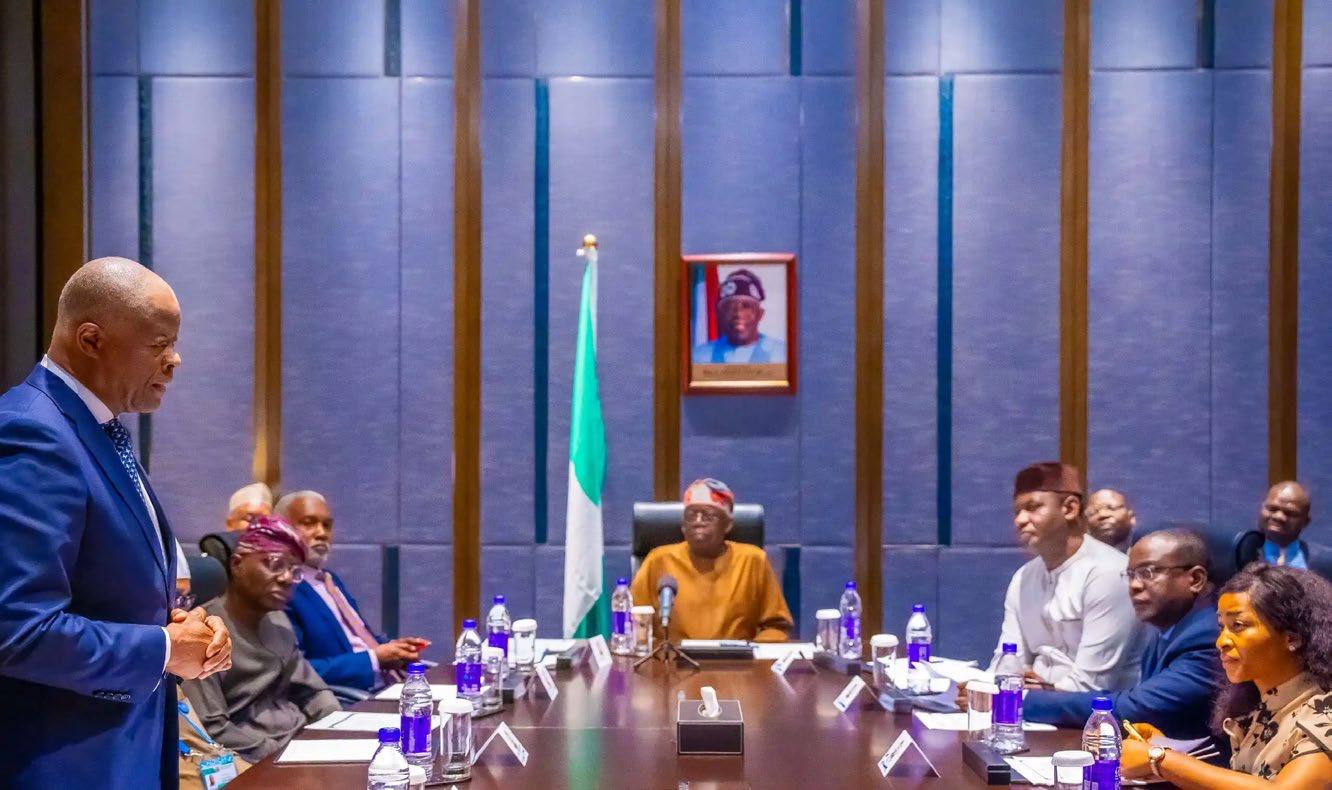
Ngelale Proceeds on Indefinite Leave of Absence
The Special Adviser to President Bola Tinubu on Media and Publicity, Chief Ajuri Ngelale, has proceeded on an indefinite leave of absence to attend to pressing medical matters affecting his immediate family.
The leave, which takes immediate effect, was announced in a statement posted on his general communication WhatsApp platform on Saturday.
Ngelale said he submitted a memo to the Chief of Staff on Friday, informing of the decision to pause his functions, including his roles as Special Presidential Envoy on Climate Action and Chairman of the Presidential Steering Committee on Project Evergreen.
While asking for privacy for his family during the challenging time, Ngelale expressed hope to return to full-time national service when circumstances permit.
The post reads: “On Friday, I submitted a memo to the Chief of Staff to the President informing my office that I am proceeding on an indefinite leave of absence to frontally deal with medical matters presently affecting my immediate, nuclear family.
“While I fully appreciate that the ship of state waits for no man, this agonising decision — entailing a pause of my functions as the Special Adviser to the President on Media & Publicity and Official Spokesperson of the President; Special Presidential Envoy on Climate Action, and Chairman, Presidential Steering Committee on Project Evergreen — was taken after significant consultations with my family over the past several days as a vexatious medical situation has worsened at home.
“I look forward to returning to full-time national service when time, healing, and fate permit.
“I respectfully ask for some privacy for my family and I during this time."
BY FELIX IFIJEH
The Catholic Bishop of Sokoto Diocese, Matthew Hassan Kukah, has lamented the current hunger and hardship in the country, saying "Nigerians are hungry".
Speaking during the formal unveiling of The Progressive Institute (TPI) in Abuja, Kukah said the reduction of the pump price of fuel will do a lot to ease the hardship.
The cleric, who recalled his experiences in the 2023 poll, said: “A girl was asked, which party do you belong to, APC, LP or PDP? She said ‘I am hungry’, so it’s important to remind our distinguished personalities here that we Nigerians are hungry. You have to find a way of reducing this price of fuel.” Kukah commended the Dr Abdullahi Umar Ganduje-led national working committee (NWC) of the All Progressives Congress (APC) over the establishment of the Institute.
He charged those entrusted with leadership positions to administer their respective domains based on positions of knowledge rather than reliance on “kolanuts chewing advisers”, spiritualists, marabouts, and speculators. On his part, Chairman of the progressives governors forum (PGF) and governor of Imo state, Hope Uzodinma, described President Tinubu as a consummate progressive, who means well for Nigerians.
While delivering the inaugural TPI lecture, Uzodinma said, “As Progressives, we are mindful of the fact that public services -education, health care, security, criminal justice, and social services are critical to equal opportunities in a civilised society Often, these can only be achieved through reforms which way seem difficult and unpalatable initially.
“For this reason, cynics may be skeptical of progressive policies, viewing them as unrealistic or economically unsound, To them, I say: Look at the evidence, Progressive policies, when implemented thoughtfully, have lifted millions out of poverty, spurred economic growth, and created more stable, prosperous societies across the world.
“We are not pursuing ideology for its sake – we are pursuing what works, The Progressive Institute will play a critical role in analysing policy proposals, ensuring that our progressive vision is grounded in sound economic principles and tailored to Nigeria’s unique context,
“Moreover, we acknowledge the challenges ahead. Implementing progressive policies in a diverse and complex nation like Nigeria is no small feat. We will face resistance, setbacks, and unforeseen obstacles and tailwinds.
BDCs Get Another $20,000 at N1,580/$ to Meet FX Demand
BY FELIX IFIJEH
The Central Bank of Nigeria (CBN) has again approved the sale of $20,000 to each eligible Bureau De Change (BDC) operator at an exchange rate of N1,580 per dollar, aiming to increase forex liquidity and meet the growing market demand. This is coming after the Naira depreciated at the official and parallel market to about 1,670/$ on Friday.
However, the apex bank, in a statement signed by the Acting Director, Trade & Exchange Department, Dr. W.J. Kanya, directed BDCs to sell to eligible end-users at a margin not more than one per cent above the purchase rate of N1,580 per dollar. Additionally, the bank directed interested BDC operators to make payments to their CBN deposit accounts.
The statement reads in part: “The CBN has approved the allocation of $20,000 to each qualified Bureau de Change at an exchange rate of N1,580 per dollar. This measure is intended to address the demand for invisible transactions.
“All BDCs are allowed to sell to eligible end-users at a margin not exceeding one percent above the rate at which they purchase from the CBN.”
BY ABDULLAHI YUSUF
The Kano State Government says it will reward two primary school headteachers who were found in their offices during vacation preparing for the upcoming 2024/2025 academic session starting next week.
Gov. Abba Kabir Yusuf announced the gesture during an unscheduled visit to Tsanyawa Central and Model Primary Schools in Tsanyawa Local Government Area where he met the headmasters in their duty posts. Spokesperson, Sanusi Bature Dawakin Tofa, said the governor was visibly impressed by the headmasters' commitment to duty even though schools are currently on vacation.
Yusuf said after consulting with the State Commissioner of Education, the State Government would determine a suitable reward to enhance the morale of the head teachers and inspire others to emulate them. He said as part of the ongoing State of Emergency on Education, the schools he visited would be prioritised to create an improved environment for teaching and learning.
BY UKANDI ODEY
Apart from the sharp focus, sense of duty and executive activism of the new management of the Jos Metropolitan Development Board led by Hart Bankat, the coming into being of the popular and well received Executive Order 003 has set the tone and momentum to refurbish and renew the environmental appeal of the Jos–Bukuru Metropolis and, to a larger extent, revalidate the corporate claim of the state as a tourism haven, or, as it is popularly put, “the home of peace and tourism”.
Prior to the Mutfwang era and intervention, Jos and its environs had degenerated into a classic case of failure of town planning and environmental malfeasance. With chaotic street trading and hawking at the city centre and erecting of illegal structures along different streets and the famous Terminus area of Jos, the state capital was already looking like an an urban slum. The immediate past administration worsened the situation when it turned what was already a discernible disaster into an issue of political bargain and cheap talk by permitting disorderly street trading and violation of environmental order as a solution and alternative to the burnt Jos Terminus Market that has been lying in ruins since 2002.
To clear the rot and the rust, the Mutfwang administration did not just conceive, formulate and launch the Executive Order 003, the traders and all the vital stakeholders in the daily activities around the Terminus area of Jos, including churches and mosques, were duly contacted and engaged and persuaded to appreciate and understand why the environment around them needs to be sanitised and the security implications of having a planned and regulated environment.
After successful talks and negotiations, the Mutfwang administration secured the understanding of the stakeholders, with the signing of the Executive Order 003 giving legal impetus to the reforms which have significantly restored order by ending indiscriminate street trading and banning wayside display of wares within defined areas, and removal of illegal structures that had defaced the aesthetics of the city centre.

Four months of implementing the urban governance order, there is much to show for it: the chaotic and hazy traffic that used to characterise the Terminus area and render it vulnerable to insecurity has since been vacated; and traders have adjusted to a new culture of orderliness and environmental sanity which has made the Terminus area more habitable and conducive for all legitimate businesses in recent times.
The richest and greatest joy of the implementation of the executive order is the manner it has reinvented and relaunched the burnt famous Jos Terminus International Market which is flourishing in the remainder of the damaged structure. While some traders have returned to use the surviving part of the damaged structure, Mutfwang showed uniqueness and ingenuity as part of the space was resurfaced, and is being used as a terminal for the resuscitated Jos Metro City Transport buses (cheerfully and cheerily nicknamed ‘Mutfwang’), themselves part of the broader urban renewal concept to ease the movement of persons, goods and services in and around the Jos-Bukuru metropolis.
Driving or moving around Jos and its environs on Fridays and Sundays has once again become a delightful and delectable experience, thanks to the implementation and aftermath of the urban convenience and peace renewal order. Hitherto, especially since bombing and violent attacks on churches became a feature of insurgents and Boko Haram horror and terrorism in Northern Nigeria some ten years ago, mosques and churches started blocking streets and roads in Jos during worship hours as part of self-help and safety measures.
The richest and greatest joy of the implementation of the executive order is the manner it has reinvented and re-launched the burnt famous Jos Terminus International Market which is flourishing in the remainder of the damaged structure “
However, during the negotiations and engagements that preceded the enforcement of the urban governance order, the Mutfwang administration, in the face of verifiable security arrangements and safety measures put in place, got all Churches and Mosques to remove barricades and allow public roads to be free for traffic while worship goes on. As at press time, there has been no report of any Church or Mosque violating the new order during worship hours since it commenced.
During an interface with youth groups and their representatives after the End-Bad-Governance protests, Governor Mutfwang spoke on the humanitarian component of the Executive Order 3 to the effect that it is still fully operational, except that the aspect of demolishing illegal structures has been put on hold
as the government has agreed on the need to provide community or neighbourhood markets to enable businesses relocate and concentrate there. Once this is achieved, he explained, the enforcement agency, namely the Jos Metropolitan Development Board, will resume demolition of illegal structures in fulfilment of the philosophy of the new order to provide and enforce urban governance and city ethics.
On the cost of governance and transparency in government operations which were basic issues in the agenda submitted to government by the End-Bad- Governance Protest youths, Mutfwang dismissed claims of certain funds allegedly disbursed to the States by the federal government, and assured that any palliatives received by the State government are duly distributed to the people, and noted that his government since inception has observed transparency and accountability as canons and pillars of faith in service to the people.
Also critical to the urban renewal programme is the reinvigorated culture and policy of sanitation and sanitary way of life throughout the State. The Plateau Environmental Protection and Sanitation Agency, PEPSA, has been proactive under the new general manager, Samuel Nathaniel Dapiya, whose crest of service is embellished with the message: “a clean environment is a shared responsibility”.
Since assumption of office, Dapiya has ensured that the State-wide monthly sanitation exercise is observed without fail. A release from the PEPSA and signed by the general manager in respect of last month’s sanitation exercise stated in part: “it is your responsibility to maintain the cleanliness of your properties and the surrounding streets. Keeping our environment clean is vital to ensuring a healthy and safe community for all”.
In spite of the foregoing mobilization and general alert, the release also emphasized that “PEPSA will be conducting inspections monthly to enforce sanitation regulations....make sure that your premises, including streets and drains, are clean and well maintained”.
The tragedy and agony of last July in Saints Academy, Jos, in which the school’s two-storey building collapsed and left human casualties met with the disciplinary and regulatory teeth of the Executive order 003 quite instantaneously. Not only were the sub-standard structures of the School brought down immediately by the JMDB, a devastated, pained, and grieving Governor Mutfwang pronounced immediate closure of the School to any form of business during his inspection visit to confirm the ramifications of the tragedy. He also used the occasion to outlaw illegal mining activities and their environmental degradation effects, and ordered the security operatives to arrest any defaulters of this without recourse to bureaucracy and protocol.
The entire process or programme of Plateau renaissance by the Mutfwang administration is apparently predicated on the principle that ‘development can only take place in an atmosphere of peace’. His administration has been up and doing in providing security in vital areas and flash points of crises in the State. In the most recent times, the state government’s effective interface and collaboration with the security agencies paid off well as the State recorded arguably the best handling and management of the End-Bad-Governance protests that rocked the country to its foundations last month.
Unconfirmed reports indicate that the Mutfwang administration plans to resume roads and culverts rehabilitation and construction as soon as the rains recede. Plateau State residents also hope that the peace initiatives in place will consolidate and endure to give the gains of the Executive Order 003 the atmosphere and latitude to flourish and sparkle.


Allawa, was in fact the security outpost of the soldiers who once secured the community until their withdrawal three months ago. The soldiers’ withdrawal, Salihu stated, has led to “a surge in terrorist and bandit activities, forcing residents to collaborate with these groups for survival.”

We call on the state government to quickly mobilise security for the area. It should liaise with the central government and its security agencies to do the needful. As a first step, assistance should be given to vigilante groups, which the community leaders said were available
t sounded like the unbelievable story of the eight corps members who spent their entire service year in the den of kidnappers and were released in batches until the last week of the service year (August 2024). That was when the last victim was released. And an obviously relieved Director-General of the National Youth Service Corps, NYSC, Brigadier-General Y. D Ahmed announced that the corps members would be awarded their certificates of service as there was no need for them to repeat the one-year scheme!
Last week in a worst example of the preceding incident, Secretary of the Coalition of Shiroro Associations in Shiroro Local Government Area of Niger State, Saidu Salihu, lamented “the increasing control of terrorists and bandits in their communities, where locals are reportedly being enslaved to work in farms for the criminals.”
What is more, Salihu disclosed, military personnel providing security in the local government area had been withdrawn, thereby exposing the people to the activities of the terrorists. Many of them, who are farmers, have fled their homes and the few who dared to brave the odds are forced to pay taxes to the terrorists before they can be allowed to go to their farms.
He disclosed that a terrorist commander collected over 20 bags of soybeans from farms in Allawa and neighbouring communities this year.
"The terrorists are growing stronger and without military intervention, the communities are at risk of becoming a terrorist stronghold," he said.
Other leaders of the community like Babangida Kudodo, President of the Lakpma Youth Forum, and Abdullah Suleiman Erena painted a horrible picture of the situation in the local government area, which poses a grave danger to life and property.
According to Kododo, some informants who were arrested and later released have become threats to the communities, further exacerbating the problem.
“The Lakpma axis, comprising eight political wards, is at risk of becoming a stronghold for various terrorist groups, including Boko Haram, ISWAP, and Ansaru,”Erena said.
Given that neither the Niger State Government nor the military high command had reacted to the story more than a week after these community leaders had a meeting with journalists, it is safe to say that the story is not only worrisome but utterly unfortunate. Niger State has been one of the worst terrorist enclaves in the country. At one point, over four local government areas were overrun by
terrorists, with Shiroro the worst hit. Whatever the reason for the withdrawal of soldiers from the local government area may be, it is clear from the lamentations of the community leaders that the communities therein are in clear danger and some drastic measures need to be taken to restore hope and sanity. Insecurity in the communities has worsened.
We call on the state government to quickly mobilise security for the area. It should liaise with the central government and its security agencies to do the needful. As a first step, assistance should be given to vigilante groups, which the community leaders said were available.
The appeal for compensation for displaced persons who have lost life and property should also be quickly addressed by both the federal and state government, which are currently busy distributing palliatives to vulnerable citizens.
For a local government area that has been under attack from different terrorist groups, from Boko Haram, Ansaru and bandits, the least the government can do is to install a permanent security post there. The story that a military outpost was removed three weeks ago paints a bad picture for the war against insecurity.
After all, the Federal Capital Territory, Abuja, is just a stone’s throw from the terror-hit local governments in Niger State.



KENECHUKWU AGUOLU
here are divergent views about Nigeria’s ability to attain a $1 trillion economy by 2030. I am still optimistic, as it is too early to conclude that it won’t be achievable. Nigeria’s economy has shown signs of improvement and potential for more growth. President Tinubu’s economic policies are gradually paying off despite not having any significant positive
To achieve its target, the Federal Government must remain focused and adopt an agile approach as today’s world is volatile, uncertain, complex and ambiguous
According to the National Bureau of Statistics, Nigeria’s Gross Domestic Product grew by 3.19 per cent in the second quarter of 2024 (on a year-on-year basis) which is higher than the 2.51 per cent recorded in the second quarter of 2023 and the 2.98 per cent recorded in the first
With Nigeria’s GDP standing at $384 billion, a GDP growth rate of 3.19 per cent is seemingly too low if Nigeria is to attain a $1 trillion GDP by 2030. However, the National Bureau of Statistics is in the process of rebasing Nigeria’s Gross Domestic Product. When the last rebasing exercise was done in 2014, Nigeria’s Gross Domestic Product moved from $270 billion to $510 billion, an increase of 89 per cent. We can only keep our fingers
It is no longer news that Nigeria’s headline inflation on a year-to-year basis decreased in July 2024, for the first time since December 2022. It dropped to 33.40 per cent from 34.19 per cent in June 2024. Also, on a month-on-month headline inflation has been on the decline consistently
since March 2024, with June 2024 being an exception. However, the government needs to monitor the situation closely, as the recent fluctuation in the value of the Naira may undermine this progress.
Nigeria’s debt service-to-revenue ratio dropped from 97 per cent to under 70 per cent under the watch of the current administration. There is still a lot of work to be done, as it is far higher than the 22.5 p per centrescribed by the World Bank. However, it has freed up resources for the government to invest more in infrastructure, healthcare, education, security, and other sectors of the economy. These investments will increase the growth of Nigeria’s Gross Domestic Product. As part of efforts to reach a $1 trillion economy, Nigeria targets an oil production of 2 million barrels per day by 2025 and is intensifying its efforts to diversify the economy. The Port Harcourt, Warri, and Kaduna refineries are yet to recommence operations, but the Dangote refinery will boost the Nigerian economy when it becomes fully operational due to the positive multiplier effect it will have.
The refinery projects a turnover of $30 billion in the next two years. More domestic refineries are expected to become operational before 2030.
The implementation of the new national minimum wage will stimulate consumer spending. Household consumption shrunk as a result of the devaluation of the Naira. The demand for non-essential goods and services dropped significantly. Companies experienced declining revenues and some downsized staff strength to remain afloat. Also, better wages lead to more innovation, productivity, less staff turnover and reduced brain drain as a result of ‘Japa’, leading to increased GDP in the long run.
Using the rebasing exercise conducted in 2014, which led Nigeria’s GDP to jump from $270 billion to $510 billion, as a precedent, one should be optimistic about the outcome of the current rebasing exercise by the National Bureau of Statistics. Furthermore, there are positive signs of increased economic growth; increased oil production, diversification of the economy, multiplier effect of the implementation of the new national minimum wage, and self-sufficiency in refining of crude oil, etc. The Federal Government must be agile and remain steadfast in its economic reforms if Nigeria is to achieve a $1 trillion economy by 2030.
BY SALISU NA'INNA DAMBATTA
Dr Reuben Abati’s recent commentary on the saga of renewed fuel queues that were largely absent in most of President Buhari’s two-term tenure and Buhari’s refusal to remove fuel subsidy towards the end of his tenure contained a major slip of the pen.
The main deficiency in the article, which somehow dimmed its value, was his failed attempt to suggest that a fuel subsidy booby trap was planted by the Buhari administration against his successor in office, President Bola Tinubu.
In Abati's imagination, President Buhari’s refusal to remove the subsidy in line with assumed or real pressure from external sources and despite the provision of Section 205 (1) of the Petroleum Industry Act (PIA), is akin to leaving “a booby trap for Bola Ahmed Tinubu”. This booby trap theory is absolutely unfounded because there is no iota of evidence to support it. It is totally speculative. A conjecture, the worst type based on unworthy hearsay. Or it is just a slip of Abati’s pen, which recurs regularly in his analysis of major national events.
Dr Abati and many Nigerians can recall that Buhari’s spokesperson, Malam Garba Shehu, in a June 2023 statement, said that removing the fuel subsidy close to the general election could have been detrimental to the ruling party, the All Progressives Congress (APC).
“The Buhari administration, in its last days, could not have gone the whole way because the APC had an election to win. And that would have been the case with any other political party that was seeking election for another term.”
Malam Garba added, “Poll after poll showed that the party would have been thrown out of office if the decision as envisaged by the new Petroleum Industry Act was made.”
But even a greater reason for the refusal of the Buhari administration to end the subsidy on fuel was to save Nigerians from the harsh outcome it could have on their well-being and the destructive effects it could have on the economy.
The Minister of Finance in the Buhari administration, Zainab Ahmed Shamsuna and other administration spokespersons said that before fuel subsidy is removed, the government must have provisions to cushion its potential disruptive effects on the population.
Indeed, the minister listed certain policy measures that would be in place before the Buhari administration could contemplates subsidy removal: Availability of autogas (LPG) as an option or an alternative to petrol as fuel for vehicles; provision of effective and reliable transit systems to reduce use personal vehicles by as many Nigerians as possible
Other measures, according to her, were the introduction of monthly transport grants for poor citizens; enhanced domestic petroleum refining toward which the Buhari administration awarded contracts for the rejuvenation of the refineries in Kaduna, Port Harcourt and Warri, and economic diversification through agriculture, manufacturing and other viable economic activities.
Going by the authoritative explanations from Malam Garba Shehu and past Minister of Finance, Zainab Ahmed, it was obvious that President Buhari’s decision not to remove the subsidy was, in a way, a strategic move to help Tinubu as the APC presidential candidate
to win the election. So, this fact alone has logically debunked Dr Abati's booby trap speculation.
Abati has by himself given more reasons, which did not support his slip-of-the pen supposition on a booby trap in his article.
THE MAIN DEFICIENCY IN THE ARTICLE, WHICH SOMEHOW DIMMED ITS VALUE, WAS HIS FAILED ATTEMPT TO SUGGEST THAT A FUEL SUBSIDY BOOBY TRAP WAS PLANTED BY THE BUHARI ADMINISTRATION AGAINST HIS SUCCESSOR IN OFFICE, PRESIDENT BOLA TINUBU

“The Buhari administration played smart by stating that the removal of fuel subsidy could result in social upheaval and that the timing would be problematic,” he penned.
And in an instance of his often combative and less than circumspect style, Abati wrote, “On May 29, 2023, at his inauguration as President of Nigeria, Tinubu allowed his emotions to get the better part of him when he suddenly announced in his inaugural speech that fuel subsidy is gone.” Past Buhari had no hand in this.
In another cancelation of his own slip of the pen, the former presidential spokesperson wrote in his opinion article that, “There may have also been persons around President Tinubu who told him to take a step that would please the IMF and the World Bank, both of which had always argued that Nigeria could not sustain its subsidy regime.”
The former editorial board chairman of the Guardian newspaper regarded the President’s decision to announce the removal of fuel subsidy as “an impulsive policy-making decision to please the Western crowd”.
He further destroyed his booby trap slip of the pen and false allegation against past President Muhammadu Buhari by linking President Tinubu’s decision on removing the fuel subsidy to “Tinubu’s populism, over-excitement and lack of caution”.
Dr Abati once again exonerated past President Buhari from his unsubstantiated booby trap slip of the pen by saying this in his article, “Tinubu created a perfect storm by removing fuel subsidy and also abolishing the dual foreign exchange rate at the same time. It is simple common sense. Both moves were populist but the timing and the combination were wrong.” So it is obvious that past President Buhari did not plant a fuel subsidy booby trap for President Tinubu, Dr. Reuben Abati should apologise to Nigerians for the big slip of his pen.

The Nigerian Foreign Exchange Market (NAFEM) recorded a total of $3.30 billion turnover in the month of August, according to data obtained from the FMDQ platform. This constitutes a 31.1 percent dip compared to $4.79 billion traded in the 25 sessions in July.
The figures tracked by THEWILL during the 22 trading days in August also showed that the highest daily turnover was recorded on August 12 with $264.44 million, while the lowest volume occurred on August 6, when the market closed at $61,90 million.
During the just ended month, the domestic currency closed at N1,598.96 on the last trading day (August 30) constituting a 0.63 percent appreciation compared to N1,608,73 it opened on August 1.

EDITOR Sam Diala
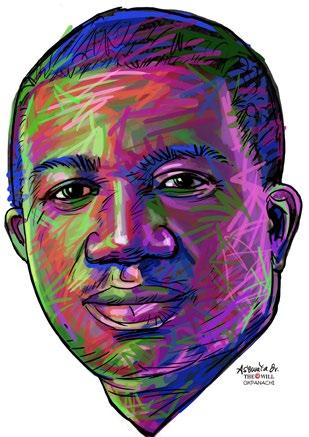
BY SAM DIALA
The recent increase in the pump price of Premium Motor Spirit (PMS), generally known as petrol, will worsen the prevailing energy crisis and spark severe challenges in the economy, with micro, small and medium enterprises (MSMEs) the worst affected.
The Nigerian National Petroleum Company (NNPC) Limited, on September 3, 2024, announced a 45 percent basic increase on the price of PMS from N617 per litre to N897 per litre. Although this is referred to as the “official” price, motorists pay up to N1, 300 per litre across the states.
As a result, the cost of transportation has increased remarkably, leading to a high cost of living and inflation that continues to impact daily life for many Nigerians. Already, businesses have been struggling to survive the wave of inflation triggered by the removal of fuel subsidy and the devaluation of the naira in the second quarter of 2023, with many firms shutting down before the recent fuel price increase.
INFLATION RATE JUNE 2023 - JUNE 2024 (%)
The biggest depreciation rate was recorded on August 30 when the naira slumped to N1,598.56 to the dollar, while it registered the strongest value on August 21 with
According to Segun Ajayi-Kadir, Director-General of the umbrella body of major manufacturers in Nigeria, the Manufacturers Association of Nigeria (MAN), 767 manufacturing companies shut down and 335 others became distressed in 2023 as CBN’s tight monetary policy, aimed at reining in inflation, bites harder.
In the same vein, the Nigerian Association of Chambers of Commerce, Industry, Mines and Agriculture, NACCIMA, Lagos Chamber of Commerce and Industry, LCCI, and Nigerian Employers Consultative Association, NECA, among others, express worry over the impact of the new pump price of petrol on struggling small businesses.

Also, Dr Muda Yusuf, Chief Executive Officer, Centre for the Promotion of Private Enterprise, CPPE, noted that strategic efforts must be made to support the MSMEs and halt the calamity that has befallen them as a result of the high cost of living and weak consumer spending.
MSMEs are, collectively, the largest employers in many low-income countries including Nigeria.
In Nigeria, there are over 37 million MSMEs contributing to over 50 per cent of Nigeria’s GDP. However, less than five per cent of these businesses have access to credit in the financial system. This necessitated the creation of the Development Bank of Nigeria (DBN) to provide a sustainable lifeline to the sector.
The DBN was conceived by the Federal Government of Nigeria (FGN) in collaboration with global development partners to address the major financing challenges facing Nigeria’s MSMEs
The objective is to alleviate financing constraints faced by MSMEs and small Corporates in Nigeria through the provision of financing and partial credit guarantees to eligible financial intermediaries on a market-conforming and fully financially sustainable basis.
In an earlier interview with THEWILL, Dr Yusuf said the government should endeavour to recapitalize DBN if it lacks the necessary firepower to play its statutory role because MSMEs as the engine of the economy are the powerhouse in terms of job creation and GDP growth.
Since its establishment, the DBN has been consistent in providing
the necessary financial support to the MSMEs towards attaining its mandate as a wholesale financial services institution.

N1,543.84 to the dollar.
The bank should step up its intervention role at this troubling time to salvage the small businesses battling for survival
Among the latest cases was the N25 million secured from KFW Development Bank of Germany in November 2023 to support the nation’s MSMEs and boost the renewable energy sectors towards revitalizing Nigeria’s economy.
Speaking on the deal, Tony Okpanachi, the Managing Director/ CEO of DBN, hailed KFW’s consistent support for Nigeria’s economy across various sectors; he emphasised KFW’s keen interest in witnessing the resurgence of Nigeria’s MSMEs and the energy sector.
“We’ve just concluded an agreement for a credit line of N25m provided by KFW to DBN for MSME financing. As a wholesale Development Finance Institution (DFI), DBN is geared to provide credit access to MSMEs through wholesale lending to financial institutions and microfinance banks,” Okpanachi explained.
Highlighting DBN’s ongoing focus on green and renewable energy initiatives, Okpanachi mentioned the bank’s collaboration with 65 financial institutions specifically to support small businesses involved in these sectors.
During the year also, DBN empowered over 4,000 MSMEs across the country through a combination of digital and physical training initiatives. Building on the success of the scheme, the bank announced the official launch of the 2024 DBN Entrepreneurship Training Programme (DBNETP) -- their flagship annual programme designed to equip MSMEs with the tools they need to thrive.
This year marks the 6th cycle of the DBNETP, as a core element of the DBN’s commitment to supporting the growth of Nigeria’s entrepreneurial ecosystem
“This is the time to appreciate the role of DBN in the economic development of this country. The bank should step up its intervention role at this troubling time to salvage the small businesses battling for survival. This is the most trying time for the MSMEs,” said Kennedy Agim, an industrialist specializing in agro-allied processing.
Agim noted that the government should extend the necessary support to DBN to ensure it, in turn, plays its role of rescuing the MSMEs which are being carried away by the terrific flood of economic challenges piercing the body and soul of the sector’s operators.
“We monitor the utilisation of funds by partnering financial institutions and, more importantly, its impact on their businesses. Our focus extends beyond disbursing funds; we remain actively engaged throughout the process to ensure a tangible impact on both the beneficiaries and the economy,” Dr Okpanachi had said.
This is the way to go. A notice on its website indicates that the bank plans a capacity building forum with the theme, “Empowering Nigerian MSMEs in a challenging global landscape” taking place on September 25, at Transcorp Hilton Hotel, Abuja.
The bank emphasised that while its mandate fully supports the stimulation of diversified and inclusive growth, it will contribute to alleviating specific financing constraints that hamper the growth of domestic production and commerce by providing targeted wholesale funding to fill identified enterprise financing gaps in the MSME segment.
The current economic hardship in Nigeria places on the bank a double responsibility towards the realization of this goal.
On Friday, August 30, marking the last trading week in the month, the Naira traded at N1,598.56 to the dollar – a marginal depreciation of N4.63 or 0.29 percent compared to the higher value of N1,593.93 to the dollar it had traded on the previous day.
The naira has recorded consistent depreciation since the ninth month of the year, September when it opened with N1,585.89 to the dollar. It thereafter dipped to N1,625,88, and further to N1,639,14, before landing at N1,593.32 to close the week on Friday, September 5.
Forex turnover has seen significant numbers during September which opened with $71,18 million, the lowest after $61.90 million on August 8; and began a surge that saw the market hit $209.61 million, the highest since August 12 when it recorded $246.44 million.
The last three days in the first week of September saw the forex turnover at $205.76 million, $185.79 million and $245.17 million. This signals a positive performance that is likely to rule in the best of September as the Central Bank of Nigeria intensifies strategies to shore up the naira through improved forex inflow that impacts the foreign reserves.
These include the commencement of the $500 billion denominated domestic bond and the increase in diaspora remittances. Nigeria recorded $282.61 million as total direct foreign exchange remittances in the first quarter (Q1) of 2024. According to the World Bank, the Nigerian Diaspora of about 1.7 million population remitted $65.34 billion in three years to boost economic activities in the country
The parallel market traded average of N1610,00 to the dollar on Friday, September 5, signaling the target of the CBN to attain a convergence of the parallel and official markets as the local currency “stabilizes” in the horizon of N1,500 to the dollar. This shows a massive depreciation of the naira compared to the N472 to the dollar it traded on June 13, 2023 before the floating of the domestic currency. The development was in line with President Tinubu’s “bold” reforms that saw the local currency tumble to N664.04 to the dollar on June 14, when the official devaluation of the currency occurred. This has become the Achilles’ heel of the troubled economy that is now consuming virtually every sector.

The Securities and Exchange Commission (SEC) has announced the implementation of new measures aimed at simplifying the process for companies to list their shares on the Nigerian Exchange.
This initiative is part of broader efforts to enhance the attractiveness and efficiency of the Nigerian capital market.
The move follows a call from the SEC’s DirectorGeneral, Dr. Emomotimi Agama, for more companies to list on the exchange.
This is in line with the Central Bank of Nigeria’s (CBN) $1 trillion economic goal, which seeks to bolster the nation’s capital market as a critical driver of economic growth.
In September 2024, Dr. Agama outlined the commission’s efforts, which include streamlining the registration process, introducing electronic filing systems, and updating regulatory frameworks.
The DG emphasized that the faster listing process will boost market liquidity, promote economic growth, and strengthen investor confidence. He stated:
“The Commission has been actively digitizing its operations, including the submission and processing of applications for securities registration, to reduce delays caused by manual processes.”
He also highlighted the role of technology in automating certain procedures, which enhances transparency.
“This involves the use of electronic platforms for document submissions and approvals, which not only speeds up the process but also improves transparency,” he added.
Further, Dr. Agama noted that the SEC has undertaken significant regulatory reforms to simplify the approval process. These reforms include updating rules to reflect current market realities and adopting international best practices that promote efficiency.
The SEC has developed frameworks for the ongoing banking recapitalization process, ensuring a smooth and transparent capitalraising process for banks.
On August 15, the commission approved recapitalization offers received from
commercial banks, marking a significant step in the recapitalization exercise.
A digitalization drive is being implemented by the SEC, including electronic submission and processing of applications for securities to minimize delays.
The commission introduced a checklist review for the registration of fixed-income securities, which has significantly shortened review and approval timelines.
Dr. Agama further noted that the SEC is committed to ensuring swift issuance processes for companies wishing to enter the market, with clear timelines for approvals.
He assured that the commission would guide applicants through the process, ensuring timely feedback and transparency throughout. These reforms are expected to make the Nigerian capital market more competitive and efficient while positioning it as a key player in achieving Nigeria’s broader economic objectives.
There are 151 companies listed on the main platform of the Nigerian Exchange.


























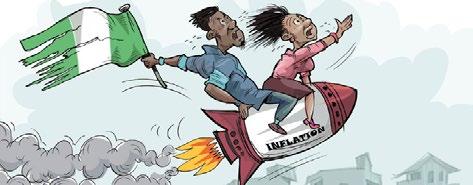


























The maxim, “when life gives you a second chance, you give it your best shot”, aptly applies to Chris Uba, the younger brother of Andy Uba, a former presidential aide to former President Olusegun Obasanjo. The Anambra State-born former political godfather who has been relegated to the background hopes to use the senatorial seat made vacant by Ifeanyi Ubah's death to rebuild his collapsed political empire. Not many who are politically aware will forget in a hurry how Chris pulled what could best be described as a civilian coup against former Minister of Labour and Productivity, Chris Ngige, during his brief stay in Government House in Awka as governor of the state.
Continues on page 20

Amajor docu-series on the incarcerated former deputy senate president, Ike Ekweremadu and his wife, Beatrice is in the works. The docu-series titled ‘Daniel vs Ekweremadu’, is written and directed by filmmaker and media personality, Chude Jideonwo. ‘Daniel’ is the name given by the documentary filmmakers to the victim-survivor. It follows a directive from the judge of the case for the real name to remain undisclosed.
‘Daniel vs Ekweremadu’ tells the story of Senator Ekweremadu’s fall from deputy senate president to British jailbird upon his conviction for organ harvesting. Part 1 of the two-part
Continues on page 20

EDITOR
Ivory Ukonu



The new fad in town, especially among upwardly mobile women and celebrities, is the Brazilian Butt Lift. More popularly known as BBL, this is a cosmetic surgery procedure that involves removing fat from other parts of the body and injecting it into the buttocks for a fuller and rounder shape. More women are visiting countries like Mexico, Brazil and USA and other places where this service is available particularly Turkey where it is reportedly cheaper. In Nigeria, clinics offering this service have sprung up in many cities across the country. The craze for bigger butts has got some of these clinics run by both quacks and professionals alike getting fully booked all year round despite persistent warning by medical experts against the potential risks of the procedure.
To successfully get a BBL nowadays, you will need plenty of luck and of course, a skillful doctor. The latter is vital to the survival of the enlargementseeking client. There have been several disturbing reports of butt lifts going wrong post-surgery. The results are often fatal.
About two weeks ago, a woman died in Lagos after undergoing the procedure. The 36-year-old victim started gasping for breath and lost consciousness after the owner of the clinic asked her nurse to administer an injection on her. Following her death, the doctor vanished from sight, but the long arms of the law caught up with her in the end.
However, despite the attendant risks, many Nigerian women have successfully undergone the surgery, some with perfect curves, some, not so perfect. IVORY UKONU spotlights a few celebrities who have admitted to having the procedure and also shared their experiences and reasons for undergoing them, thus contributing to the ongoing conversation about beauty standards and body image.
Self-acclaimed relationship expert, Blessing Okoro, a.k.a Blessing CEO, after gaining social media visibility had felt that the next best thing to do is to get a Brazilian Butt Lift, BBL. This she acquired in 2022. This was in addition to liposuction, fat removal from specific parts of the body, but particularly from the stomach, which she also did. The liposuction was to help enhance her shape and make the BBL more prominent. She claimed to have spent N3 million to get done. The divorced two revealed that she done in the Lekki area State. As a social personality, documented procedure which shared with her She would later reveal that she thought some people she met at the hospital might leak her videos before her. For this reason, she decided to document the process herself.

Former Big Brother Naija reality star, Oluwabusayo Abiri, more popularly known as Khloe, whose outspoken nature made people love her while on the reality show, has made it known several times that she went under the knife for a more rounded breast and threw in a BBL for effect. Her reason, like most others, was because she hated how her body looked and needed to do something about it. Since she had the BBL done, Khloe who now runs a skincare business never fails to flaunt her new banging body. She did reveal that she almost committed suicide when a picture of her naked and unconscious after the procedure went viral. Khloe has never hidden her disdain for what she refers to as the hypocritical opinion of some Nigerians over getting BBL, particularly when they want to also undergo the procedure themselves. But one thing she has vowed never to do is to go under the knife again for another BBL procedure because of the attendant pain that comes with the procedure.
While advising those who may be interested in doing the procedure, she explained that the reason why some have complications with their BBL is because they don’t do enough research about the process and procedure, which leaves their behind way more massive than any other part of their body after a while. She stated that before surgery care is as important as the aftercare, which must be done religiously. She emphasised that some after self-care like drills involving faja, making use of waist trainers at all times, what activity one engages in, what one eats and how one keeps the transferred fat alive are very essential to the success of the procedure. The process, according to her, starts with the type of body one wants, the style that fits one's stature and the need to make the outcome look as natural as possible. She warned against ladies who want their surgeons to simply pump fats into their backsides excessively, saying that the fat might attempt to regenerate and could lead to an unexpected burst.
Media personality and lifestyle entrepreneur, Omotoke Makinwa, has been very open about her body makeover journey. First, she started by bleaching her skin because she thought it would keep the wandering eyes of her ex-husband, Maje Ayida, who likes very fair skinned women, focused on her. She says that bleaching her skin was the dumbest thing she ever did. Then she graduated to getting a BBL after getting rid of fibroids in her body.

The soon to be 39-year-old, says she does not regret enhancing her body as it is the best thing she has ever done as the surgery helped to enhance her appearance and make her look better and curvier in clothes.




The Nollywood actress who once confessed to bleaching her skin before putting an end to it is one of the many celebrities who decided to enlarge their bum via BBL. Although Lilian has never explicitly admitted to getting a BBL, she however did hint so in a post on her social media page while recounting an incident that made her purge while commuting between Edo State and Abuja for a movie production. She had said in a veiled remark that she would not allow anything to deflate her surgically enhanced bum which she was preserving and would only take out the fat when it no longer serves her. Her BBL does give her the perfect hourglass figure and that makes any outfits she wears look way better than it would have if she didn’t get a BBL.

Former beauty queen and ex-Big Brother Naija housemate, Rebecca Nengi Hampson, disclosed that she had BBL because she was uncomfortable with her big stomach. She said that she removed fat from her tummy and transferred it to her butt to get the hourglass look she had always desired. She advised anyone not feeling confident about anything in their body to change it and feel better about it. She also revealed that her only regret was not documenting her surgical procedure.

Apart from getting a liposuction and a breast reduction at different times, former Big Brother Reality show contestant, Nina Nwadinobi, a.k.a Nina Ivy, has gone under the knife for a BBL. The twice married entrepreneur who currently resides in America has never hidden this fact and she has made a show and dance of it. She got her BBL in 2021 because according to her, she wanted a perfect body shape.

lthough Hilda Bassey, the Akwa Ibom-born chef who broke the Guinness World Record, GWR for the longest cooking time as an individual, hasn't exactly admitted to getting a BBL, it is obvious, when compared to some of her throwback pictures, that she got her bum surgically enhanced. Besides, shortly after she broke the GWR, an Abuja based cosmetic surgery clinic, Renew Aesthetics Clinic posted a before and after photograph of her after she got her bum enhanced. They claimed to have carried out the surgery and in celebration of her feat, were offering one lucky lady a complete body reconstruction surgery free of charge. The lucky lady they said would be chosen by Hilda herself from her hordes of fans. Like most people who have had their bum enhanced, Hilda never passes on the chance to show off her curvy figure.
Edo State born former stripper and ex Big Brother Naija housemate, Chinenyenwa Desire Okoebor aka Chichi, did go under the knife to surgically enhance her bum via BBL. Although she hasn't quite admitted to this, but it goes without saying that she did particularly because her fellow housemate, Josephina Otabor aka Phyna, winner of the reality show for season 7 while on the show, taunted her to no end for going under the knife and not having a bum as curvy as should be expected. Chichi would later respond to Phyna after the show ended, slamming Phyna for also doing the same thing she (Phyna) had criticized her (Chichi) of.

Fashion entrepreneur and winner of the Big Brother Naija season four, Mercy Eke had liposuction where she moved fat from her stomach to her butt area for a BBL. She has equally been quite open about enlarging her bum, though she admitted that peer pressure and trends in 2018 influenced her decision to get a BBL. She said she got the procedure done alongside two of her friends despite having a good form. She recounted the experience, noting that she didn’t inform her mother to avoid getting discouraged. She described the post-BBL experience as painful, particularly the discomfort of having to lay on her stomach for about 14 days to avoid pressure on her bum. Also, during massages by nurses during the post operation, to get water out of her body she felt a lot of pain. Despite the discomfort, Mercy revealed that the procedure is worth it as her bum feels like water.



who likes to go under the knife, that would be controversial former actress and aspiring politician, Tonto Dikeh. The divorced mother of one has never hidden her love to do whatever it takes to have a curvier figure even at the risk of her health and life. Besides having gone under the knife on three different occasions for a liposuction, she surgically enhanced her bum via BBL. Although she didn't document the procedure, she however informed her fans via a video she recorded, on what she was embarking on shortly before she was wheeled into the theatre. The former deputy governorship candidate of the African Democratic Congress (ADC) in the 2023 governorship election in Rivers State, once stated that her doctor and not God gave her a sexy body.


STORIES BY IVORY UKONU
Ajayi Joshua Oluwatobi is not only 36 years old, but he also sits atop a business that is currently valued at over N4 billion naira. He is the Chairman /CEO of NORD Automobiles Limited, one of the first Nigerian automobile brands and Africa’s premier automobile corporation. Widely described as a creative and astute entrepreneur, Ajayi has carved a niche for himself in the business world as one of the most influential people in the Nigerian automobile industry, winning both local and international awards and recognitions for his contributions to the automobile industry in Nigeria and Africa. He was listed by Forbes as one of the most promising young entrepreneurs in Africa for 2018. The graduate of Soil sciences and Farm Mechanisation from Olabisi Onabanjo University started his career at Mercedes-Benz Nigeria where he did the mandatory National Youth Service. He climbed quickly up the ladder to become the head of division (vans) and later co-founded Jetvan, an authorised dealer of MercedesBenz. From 2013 - 2015, he was able to grow the market share of Mercedes-Benz vans from less than 1% to 7%. In 2013, he won the Mercedes-Benz Best Sales Performance for Africa. After his trip to Mercedes-Benz factories in Europe and Asia, he realised that with hard work and focus, he could build his own Nigerian global and reliable auto brand. In April 2015, together with some investors, Tobi left Mercedes Benz to concentrate fully on Jetvan Automobiles Limited. Via Jetvan, he took the
Continued from page 18
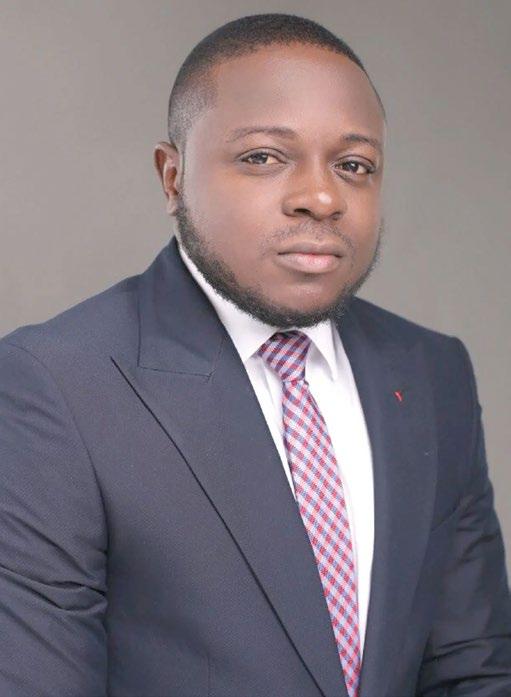
Mercedes-Benz vans sales and after-sales to the next level. He was at Jetvan as CEO until April 2018 when he left the company to enable him to focus on building his own personal brand and company, Nord Automobile Limited. He now assembles his own elegant, reliable, durable, and cost-efficient vehicles that are as good as any vehicle in the world. According to the last valuation, Nord Automobile is worth a little over N4.2 billion. Joshua is an alumnus of Lagos Business School (Pan Atlantic University) where he bagged his MBA. He also has a certificate from the IESE Business School Spain after concluding his Pan African EMBA Module. He is a Fellow of the Institute of Credit Administrators.

DContinued from page 18
At the height of his fame, Uba enjoyed tremendous support all through the time Obasanjo was in government, courtesy of his brother. He held sway, was loved by many and had a large following. He was a kingmaker and the ultimate ‘cabal’ in the state. Many dreaded him as his words were law. He made
and broke many politically. But that was until Ubah demystified him and broke his stronghold. There are indications that he may likely throw his cap in the ring for the by-election of the Anambra South Senatorial district soon to be announced by the Independent National Electoral Commission (INEC).

docu-series was released in late August. Shot in Nigeria and the United Kingdom, the series includes exclusive access to British prosecutors, the police, the family of the survivor-victim, in this case, 'Daniel' amongst others. Some of the revelations the docu-series will be highlighting is how Evelyn Agbasonu, an Igbo interpreter who allegedly asked for payment of £1,500 to help coach 'Daniel' who was approached to secure a private kidney transplant for Sonia, daughter of the Ekweremadus, turned on her clients. 'Daniel' reportedly said in court that Agabsonu, a longtime staff of the Royal Free Hospital turned on the Ekweremadus, saying to him (Daniel), ‘don’t do it’.


Agbasonu had helped interpret Igbo in an initial meeting between Dr. Peter Dupont who was to carry out the procedure (organ removal) and 'Daniel.' It was after the meeting that the doctor decided the transplant could not go ahead. Ekweremadu’s brother, Diwe, brokered the meeting between Agbasonu, 'Daniel' and the Ekweremadus, unknown to him about what she eventually planned on doing. The Ekweremadus were sentenced last year to 10 years and six years respectively in a British jail for human trafficking. They became the first set of people to be sentenced to jail alongside a doctor-friend, Obinna Obeta, under the United Kingdom’s Modern Slavery Law.
ame Christine Doja Otedola, mother of billionaire businessman Femi Otedola is all set to be honoured by Pope Francis, the leader of the Catholic `Church. The former Lagos First Lady will be receiving the Catholic Church’s highest honour, The Papal Honours on September 14. The Catholic Archbishop of the Metropolitan See of Lagos, Most Rev. (Dr) Alfred Adewale Martins will confer the honours, on behalf of Pope Francis, on Lady Doja and five Lay Faithfuls of the Archdiocese at the Holy Cross Cathedral, Lagos. She will be honoured as a Medalist in the Pro Ecclesia et Pontifice category. The Papal Honours system encourages aspirations and ideals of the highest standards and values within the Catholic Church by recognising people who have shown outstanding valour and bravery. All honours and awards are granted by the Holy Father with the local church promoting nominations. The matriarch of the Otedola family leads a quiet and spiritual life. The 92-year-old Catholic faithful Lady Doja is a fulfilled woman with children, grand and great grandchildren. When she was 85 years old, she erected the Grotto in honour of Mother Mary. For her 90th birthday, the former First Lady of Lagos, single-handedly financed the construction of the newly completed ultra-modern auditorium for St. Peter’s Catholic Church, Odoragunshin, Epe, Lagos State. A teacher by training, she was baptised as a Catholic in July 1958 at St. Dominic’s Priory, Southampton Road, London. The other honorees include, Peter Amangbo, Walter Akpani, Peter Nwanze and Julius Olufunsho Britto.

Media personality and actress, Alex Okoroji, has decided to move past the pain of her failed marriage and has given love a second chance again. Alex who is the daughter of Tony Okoroji, a former president of the Performing Musician Association of Nigeria, PMAN and chairman of the Copyright Society of Nigeria, COSON, remarried in a very simple ceremony to Eric McGill last weekend at Turf Valley Resort in Ellicott City, Maryland, USA. The day, August 30 was coincidentally Eric’s birthday. It was the final leg of their six months long wedding festivities. The couple had the first leg of their wedding on March 10, 2024, which was also Alex’s 40th birthday. The private wedding ceremony
took place at the Concord Lighthouse and Waterfront at Havre de Grace, Maryland USA. Alex used to be married to Ghanaian born actor, Omar Captan. Their union produced a son before it packed up a few years ago. Alex is the global chairperson of G100 Media Arts & Communication (G100MAC), a group of global women leaders who came together to create an equal, progressive and inclusive environment for women worldwide as well as addressing genders gaps and achieving gender parity within this decade. As global chair, she is responsible for the development of G100MAC's vision, strategy, network and mission to enhance the visibility and advancement of women.
Photo Editor: Peace Udugba [08033050729]


Customer Support, Moniepoint Inc, Adaeze Onwubuemeli; Associate Product Manager and Participant, Moniepoint WIT 1.0, Barakat Ajadi and Employer Branding Lead, Moniepoint Inc, Gbemi Adekanmbi, at the Moniepoint Women in Tech 4.0 mixer, held in Lagos on September 5, 2024.
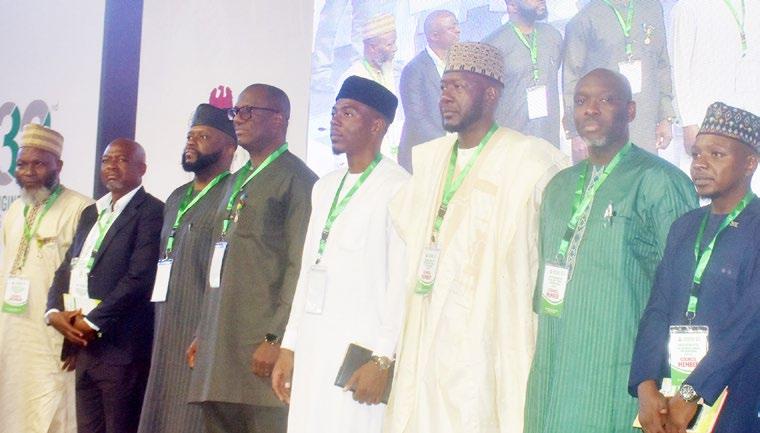



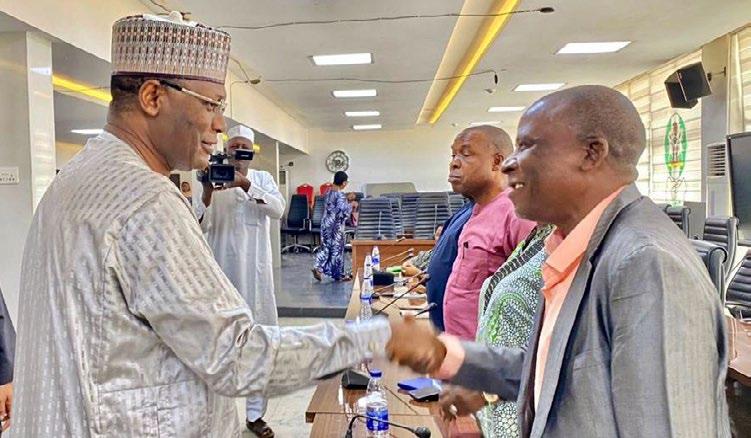




BY JUDE OBAFEMI
The Nigeria Football Federation (NFF) has once again found itself embroiled in controversy following its botched attempt to appoint German coach, Bruno Labbadia as the new Super Eagles manager. This latest fiasco has left Nigerian football fans frustrated and questioning the competence of the federation's leadership.
The saga began with high hopes, as rumours swirled about potential high-profile candidates for the Super Eagles job. Names like Herve Renard, the French coach who has won two Africa Cup of Nations titles and Portuguese manager, Conceiçao were mentioned as possible contenders. These reports generated excitement among supporters, who believed the national team might finally secure a coach with some

Looking ahead, the NFF must approach its next coaching search with far greater care and discretion
However, as weeks turned into months without any official announcement, patience began to wear thin. Then, in the early hours of last Tuesday, the NFF suddenly declared that they had reached an agreement with Labbadia to become the new Super Eagles head coach. The timing of this announcement, made while most Nigerians were asleep, immediately raised eyebrows.
The reaction from football fans was swift and largely negative. Many criticised the NFF for settling on a relatively unknown quantity after such a prolonged search. Labbadia, while experienced in German club football, has never managed a national team or worked in Africa. His lack of continental experience and trophy-winning pedigree at the highest level left many supporters underwhelmed.

crucial Africa Cup of Nations qualifiers at hand, the team finds itself without a permanent head coach.
The NFF was again forced to turn to the Federation's Technical Director Augustine Eguavoen as a stop-gap measure, marking his fourth stint in temporary charge of the national team.
This revolving door of coaches has become an all-too-familiar pattern for Nigerian football. The departure of Jose Peseiro earlier this year after the last AFCON, followed by the brief tenure of Finidi George, had already created instability within the squad. The Labbadia fiasco only serves to exacerbate these issues, potentially derailing the team's qualification campaigns for both AFCON and the World Cup.
But the true embarrassment was yet to come. Just days after trumpeting Labbadia's appointment, reports emerged that the deal had fallen through due to complications surrounding German tax regulations. The NFF was forced to backtrack, admitting that they had failed to finalise crucial details before making their premature announcement.
It is worth noting that in the wake of this confusion, false rumours began circulating on social media about the reasons for Labbadia's rejection of the job. A fact-check by FIJ (First Information Journalist) debunked claims that Labbadia had quit due to threats from senators and politicians demanding 10 per cent of his salary. These unfounded rumours, which spread rapidly online, only added to the public's frustration and highlighted the need for clear, official communication from the NFF.

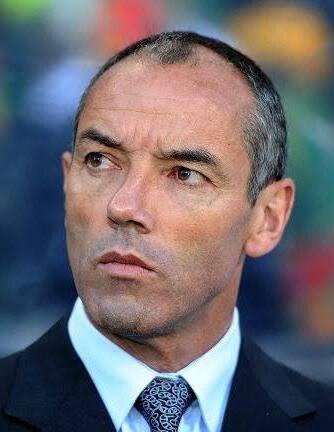
NFF President Ibrahim Musa Gusau attempted to explain the situation, stating: "The tax details were never part of our discussions and he had personally agreed to all terms before the tax issue came up. We were doing our best to be flexible in the discussions, but he was adamant that the NFF had to pay the full tax amount as well. We simply cannot do that."
This statement raises serious questions about the NFF's negotiation process and due diligence. How could such a fundamental issue as tax liability be overlooked in initial discussions? Why was the appointment announced before all contractual details were ironed out? These oversights point to a concerning lack of professionalism and thorough planning within the Federation.
The fallout from this debacle leaves the Super Eagles in a precarious position. With
Beyond the immediate sporting implications, this incident further erodes public trust in the NFF's leadership. The Federation has a history of questionable decisions and premature announcements regarding coaching appointments. In 2016, they prematurely named Paul Le Guen as Technical Advisor, only for the Frenchman to reject the role citing unmet terms. A similar situation occurred in 2017 with American manager Randy Waldrum and the Super Falcons’ job.
These repeated missteps paint a picture of an organisation that struggles with basic professional standards and transparent communication. The NFF's tendency to rush announcements before finalising details suggests a prioritisation of public relations over proper due diligence. This approach not only damages the Federation's credibility but also potentially harms Nigeria's ability to attract top coaching talent in the future.
To address these systemic issues, the NFF must undergo a serious internal review of its recruitment and negotiation processes. Greater transparency is needed throughout the hiring process, with clear communication to stakeholders about the criteria for selection and the progress of negotiations. The Federation should also consider bringing in external expertise to assist with contract negotiations and ensure all legal and financial implications are thoroughly understood before any commitments are made.
